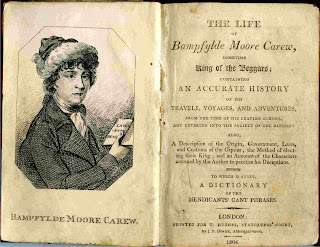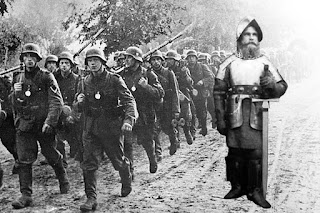King of the Beggars or History's Greatest Literary Conman? The Life and Adventures of Bampfylde Moore Carew
Some called him a conman, a scoundrel and even a criminal. He named himself the “King of the Beggars” and published an international bestseller that detailed his exploits as a wandering vagabond who lived on the margins of accepted society. He claimed it was a one-hundred percent true autobiography. His detractors said that his work was nothing more than pure fiction. But one thing is certain--Bampfylde Moore Carew’s literary talents made him one of the 18th century’s most famous (and infamous!) celebrities.
To this very day, nearly three hundred years later, the question still remains--Who really was this self-proclaimed “King of the Beggars” Bampfylde Moore Carew? And is there anything today that we know about this man that is even remotely true?
History doesn’t tell us exactly when Bampfylde Moore Carew was born, but church records tell us that an infant by that name was baptized on the 23rd of September in the year 1690 at a church in Bickleigh in Devon, England.
Those meticulous treasure troves of historical information--church records--also tell us that the infant who would become the world’s most infamous vagrant and vagabond--The King of the Beggars Bampfylde Moore Carew--was the son of a devout Anglican Minister!

Bickleigh Church in Devon where Carew was Baptized
At the time when he was born, around the turn of the 18th century, Bampfylde Moore Carew’s family was quite well known and influential in and around Devonshire. But with regards to the years just after Bampfylde’s birth, the historical record contains a paucity of information, and almost nothing is definitively known about his early life.
What little is known about Bampfylde Moore Carew’s early life and upbringing comes to us from Carew’s own autobiographical work, the dubious literary work that would go on to make him famous all around the western world, The Life and Adventures of Bampfylde Moore Carew.
Secondhand sources that talk about the life of Bampfylde Moore Carew often refer to his family members as both aristocratic and as notorious adventures who were well known throughout the county of Devon, England during the 17th and 18th centuries.
Young Bampfylde Moore Carew, as school records indicate, at the age of twelve years old, sometime around the year 1702 or 1703, was enrolled in the somewhat prestigious Blundell’s School in Tiverton where he apparently excelled in the study of both Latin and Greek. It would appear that it was Bampfylde’s family’s intention to have him follow in the footsteps of his father and pursue a career as an Anglican clergymen, however, as it turned out the life of Bampfylde Moore Carew was destined to head in a most decidedly different direction.
 |
| Prestigious Blundell School in Tiverton today |
Beginning at the age of fifteen Carew would first find himself in trouble. While still enrolled at Blundell’s School, Bampfylde and some of his friends, carelessly destroyed some crops of farmers who lived near the school while out hunting. Fearful of what their punishment might be if caught, the three adventurous boys ran away from school and took to the open road.
In his autobiography Carew goes on to relate that after hiding out in the woods overnight, too fearful to go back to the Blundell school which was notorious for strict discipline and harsh punishments, that the three teenagers eventually wandered into a nearby tavern and had a chance encounter with a, “Lively band of gypsies,” as Carew stated in his own words.
It must be kept in mind that during the 1700’s in England and the United States the term “gypsy” did not necessarily refer to a person of Romani descent but rather could be used to label any person who lived a bohemian or counterculture lifestyle as a wanderer, beggar, mendicant or even traveling salesman.
So that even though in his autobiography The Life and Adventures of Bampfylde Moore Carew, Carew himself says that he “Became a gypsy,” and writes of taking oaths and being fully initiated into the gypsy lifestyle, it seems more probable that he simply joined a group of itinerant drifters, criminals who frequented taverns and ale-houeses and engaged in a life of petty crime rather than ethnic gypsies who lived a traveler lifestyle.
But, anyway, within a mere matter of days after his chance encounter in a tavern, the young Bampfylde Moore Carew instantly set off on the dissolute lifestyle that would one day so enrapture readers of the Georgian Era and make him an international celebrity after his autobiography was published.
The young Carew roamed throughout England, often in disguise scamming one person after another out of money; winning the hearts of young maidens everywhere only to leave them penniless, heartbroken and jilted at the altar after their assumed groom to be, Bampfylde Moore Carew, had disappeared like the thief in the night that he most assuredly was.
As a joke, Bampfylde, it is said, even went back to his parent’s house in disguise and apparently fooled his own mother and lived with his parent’s for several months under an assumed name before revealing his true identity to his mom and dad.
According to Carew’s autobiography, when his parents discovered that it was really him, they begged him to stay, but after the excitement of the vagrant lifestyle that he had been living, Bampfylde could hardly stand the restraints of normal society. Carew said that while he lived back home with his family he missed the, “...Uncommon pleasure that he had enjoyed in the community he had left…the freedom of their government…the frequent change of habitation…the perpetual mirth and good humor that reigned among them..”
Yearning to be free, young Bampfylde Moore Carew promptly ran away again and took up once more with his band of itinerant gypsies. During his lifetime Carew was known far and wide throughout England as a master of disguise and as the world’s best conman.
It was reported that Bampfylde Moore Carew at one time or another, and often repeatedly to con unsuspecting citizens out of their hard earned money, successfully impersonated an old widow, the homeless victim of a house-fire, a shipwrecked mariner from North America, and a farmer who had lost all of his livestock and crops during a great flood.
Perhaps, his most famous act was wandering through various towns and cities wrapped in nothing more than an old blanket and otherwise completely naked and begging from affrighted townspeople in the guise of a character he called “Mad Tom”.
 |
| Bampfylde Moore Carew King of the Beggars |
He never had a job, or learned a trade, something extremely rare for the 18th century, a time when many other indigent men, women and even children were forced into indentured servitude simply to keep from starving to death.
At some point, after spending years as what he himself would call, The King of the Beggars, for reasons still unknown, Bampfylde Moore Carew set sail in the 1740’s to try his luck in the American Colonies, at least that’s the reason that Carew gives in his autobiography for his setting sail for the New World.
But in all likelihood, at that point, Bampfylde Moore Carew was a convict who was being deported, transported in the parlance of the times, to America as punishment for his crimes of fraud, impersonation and idleness.
All of this made for a very exciting story to eighteenth century readers, and for a one of a kind life, but the only problem is that it is impossible to tell if any of it is really true. Even his own work The Life and Adventures of Bampfylde Moore Carew first published in England in 1749, was probably not literally written by Bampfylde Moore Carew.
Carew wrote that the contents of his autobiography were, “Noted by himself during his passage to America,” but for some reason it would seem that Carew may have dictated the work to others upon his return to England. All we know for certain is that Carew either decided to return to his hometown of Bickleigh, or was forcibly sent back there, in around 1745, aged now in his mid-fifties and settled down by living off (free-loading!) the generosity of wealthy relatives.
But, the irony is, that the literary work that Bampfylde, may or may not have written entitled The Life and Adventures of Bampfylde Moore Carew made him the self-proclaimed “King of the Beggars” the most wealthy and well known of all the Devon Carew’s in history!
First published in 1749, The Life and Adventures of Bampfylde Moore Carew, would remain in print for nearly fifty years and be an international bestseller on both sides of the Atlantic well into the 1780’s. The odd part is, though, that it’s impossible to tell if any of the stories and events written about in The Life and Adventures of Bampfylde Moore Carew are even true or if the whole book, marketed as an autobiography, was simply one man’s attempt to mislead the public and make a lot of money through a work of fiction.
It’s impossible to know if anything in Carew’s Life is true or not. Though Bampfylde Moore Carew without a doubt traveled widely in his lifetime, and though he definitely committed some petty crimes both in England and America since there are court records that confirm some of his convictions, his work is most probably simply too fantastical to be a true autobiography in the modern sense of the word.
The 1740’s were still a time when the market for writing and publishing fiction was not very lucrative. Most early novels, no matter how far-fetched, were marketed as wholly true stories. The most famous example of this is Daniel Defoe’s Robinson Crusoe, which though loosely based on the life of seventeenth century castaway Alexander Selkirk, is entirely a work of fiction, but at the time that it was written the reading public at large believed it was entirely factual, and Daniel Defoe, for his part, never did anything to persuade the legions of readers of Robinson Crusoe otherwise during his own lifetime.
Bampfylde Moore Carew died on June 28, 1758 in his hometown of Bickleigh. When he died he was already known the world over as the “King of the Beggars” thanks to a work that he marketed as his own autobiography, but perhaps, in an ironic twist, history should remember Bampfylde Moore Carew as King of the Conmen for his work The Life and Adventures of Bampfylde Moore Carew.






Comments
Post a Comment